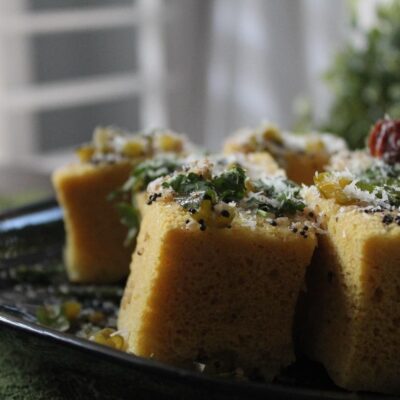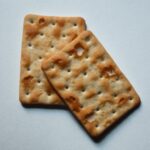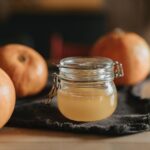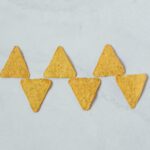Yes, it is safe for dogs to eat basic cornbread in moderation. Of course, some dogs might suffer from grain sensitivities and allergies. However, that is not the case for most dog breeds. That being said, cornbread should only be fed to dogs as an occasional treat because it contains sugar and salt. Generally, treats should only make up around 5-10 percent of your dog’s daily diet, depending on the size and breed of your dog.

Safe: This food is generally considered safe by the veterinary community. Dogs can eat this food sometimes or in small amounts but contains little to no nutritional value.
| Food Safety | Safe to eat in moderation |
| Nutritional Value | Folic acid, amino acids |
| Potential Risks | Grain allergies, vomiting, diarrhea, stomach pain, obesity |
Feeding Dogs Cornbread
Cornbread has been warming our hearts and filling our bellies since its humble origins in Native American cuisine. This scrumptious side dish’s irresistible, golden-brown crust and tender crumbs have made it a staple at Southern-style cookouts, cozy Thanksgiving feasts, and even the occasional Wednesday night dinner.
Now, picture this: it’s a perfect summer day, and the mouthwatering aroma of barbecued goodness wafts through the air as you enjoy a sizzling cookout with family and friends. Your trusty canine companion sits patiently by your side, looking up at you with those big, pleading eyes. Or perhaps it’s Thanksgiving, and a few scrumptious cornbread crumbs tumble from your plate, catching your pup’s attention. The question arises: can you share a nibble of this golden delight with your furry friend? Yes! Let’s dive into the details of feeding cornbread to dogs.
How Much Cornbread Is Safe for Dogs?
Cornbread is very dense in calories. A 1.5 oz cornbread muffin has 180 calories, which is far beyond the desired serving size for a treat, even for a large dog. A small 10 lb dog can have about a 2 in square piece of cornbread, or about 3 crumbled tablespoons as a special treat.
This baked bread doesn’t have many nutritional benefits, it’s very high in sugar and fat. A typical human portion of cornbread comprises roughly 18 grams of sugar and 180 calories, depending on how it is cooked. That makes up around 4.5 tablespoons of sugar and 140 mg of sodium. So you can see that a dog can only have a small bite of this cake-like treat.
What Happens if Your Dog Eats Too Much Cornbread?
Your dog can’t get cornbread poisoning, but eating too much fat and sugar-laden foods, especially over the long run, will cause excessive weight gain to your pet. Cornbread contains folic acid and amino acids, but these are the only beneficial nutrients it can offer for canines. The additional additives included in cornbread are usually what can cause problems for dogs. A small amount of corn kernels is okay for dogs but may cause digestive issues. Some people may also include extra honey or sugar in homemade cornbread. However, eating too much sugar can lead to an increased risk of cardiovascular disease, obesity, and dental issues in dogs.
Common Cornbread Ingredients
Corn kernels: Corn kernels are safe for dogs in moderation. In fact, corn is rich in minerals, vitamins, and other beneficial nutrients.
Butter: Dog should not eat butter in excess as it can lead to obesity, pancreatitis, and other health issues.
Sugar: Feeding your dog too much sugary human foods such as cornbread can cause obesity, tooth decay, and other issues.
Salt: Salt is toxic for dogs in large amounts. Feeding your dog too much salt daily can lead to salt ion poisoning.
Extra ingredients and topping: Some cornbread contain extra toppings and mix-ins. It’s best to read the label or ask the chef what has been added to avoid giving your pup cornbread that is potentially toxic.
- Onions, scallions, garlic, chives- Unsafe and toxic to dogs
- Bacon, sausage, pepperoni- Ok in small amounts
- Cheese- Most dogs are lactose intolerant and can suffer from diarrhea, vomiting and bloating
- Jalapeños or other spicy peppers- Spicy foods should be avoided as it can upset their stomach
- Herbs– Cornbread can be topped with basil, dill, thyme or sage and might be the only healthy addition to this treat
Final Thoughts
The good news is that plain cornbread can be a-OK for dogs in moderation! This tasty treat offers a few nutritional perks, such as fiber, protein, and vitamins. However, it’s best to keep it as an occasional treat to keep your pup’s tail wagging for years to come. So go ahead, sneak a little morsel of simple cornbread to your four-legged buddy, and let the good times roll! Just remember, moderation is key, and Fido will be as happy as a clam (or should we say, as happy as a dog with cornbread!).
Frequently Asked Questions
-
Cornbread has no nutritional benefits, but it is safe as a small treat. However, some cornbread recipes contain harmful ingredients such as onions, cheese, and garlic and should be avoided.
-
Plain cornbread without salt, sugar, and other toppings/ingredients is safe for dogs. However, cornbread should not become a part of your dog’s daily diet. Instead, it should be an occasional treat.
-
For many years, dog food companies have used cornmeal as a filler. On the other hand, corn is not a natural component of the canine diet. Therefore, it should be avoided.







